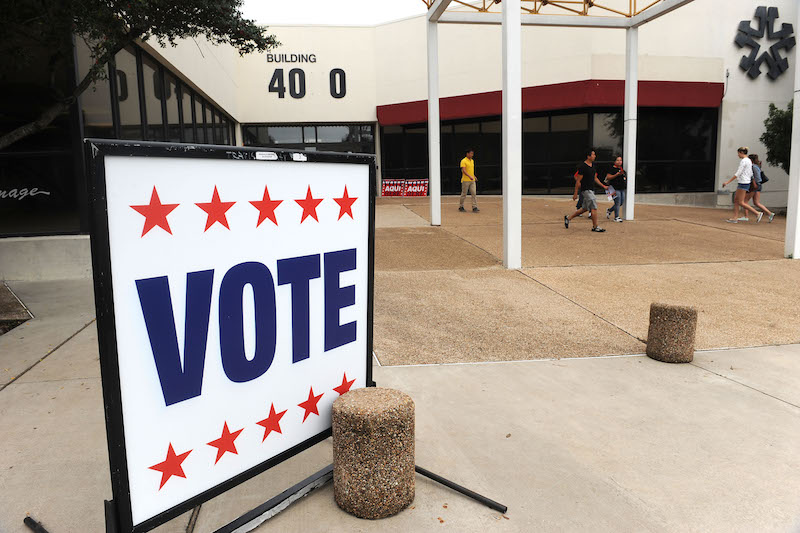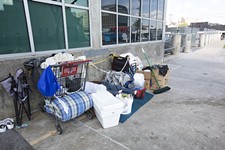Beside the Point: Referendum, Texas
Let’s vote on ... something, anything, and all of the time
By Chase Hoffberger, Fri., July 20, 2018
City Council continues its summer break this week, meaning much of the usual commotion around City Hall has dwindled, and will continue that way until Aug. 9, when members reconvene. The relative calm means that the big city news this week broke out a few blocks up the street, at the Heman Marion Sweatt Courthouse, where on Monday Travis County District Judge Orlinda Naranjo ruled that the "CodeNEXT petition" – that springtime affair to put before voters a choice to have every major land use rewrite be subject to a public vote (or not) – must be honored by the city, meaning voters in November will vote on whether they'd like to take a future vote. Sarah Marloff has spent much of this week parsing through Naranjo's two-page ruling and accompanying letter; that breakdown's at "About That CodeNEXT Petition …." Even though Naranjo has issued a ruling, the ramifications are not simple, and likely will continue to require scrutiny and clarification as we barrel toward November.
Monday's ruling concerns referendums on nothing but land use rewrites, but it's hard not to see the petition as part of a grander, ongoing effort to put single issues onto election ballots. Just last week, the Citizens for an Accountable Austin PAC submitted enough signatures to the city clerk to put the prospect of an efficiency audit up for a vote in November ("How Efficient Is Your City?," July 20); CAA treasurer Michael Searle delivered the list of signatures alongside the effort's adviser Fred Lewis, a central figure in the CodeNEXT petition. And just the other week, in a brief email to Mayor Steve Adler and City Council that got copied to the Chronicle and Statesman, Zoning and Platting Vice Chair Jim Duncan suggested that the fate of McKalla Place – and the question of whether to put a soccer stadium on its grounds or earmark it for a mixed-use development with some degree of affordable housing – be subject of a November vote. Duncan cited a similar situation in Miami, Fla., where a soccer stadium has also been eyed for a parcel of publicly owned land. City commissioners there were deciding whether to approve plans to put that to a public vote in November as this issue went to press.
Duncan idealized the suggestion as a way to increase voting: "Would it not be a further stimulant, along with our City Council, bonding and CodeNEXT ballot items, to get people to the polls? We might even set some turnout records!"
Your Vote Counts
Referendum votes in Austin are nothing new. For years citizens have tried to determine the fates of single issues at the polls, whether to recall the mayor (Will Wynn, 2005), council members (most recently Ann Kitchen, in 2016; see "We Were Once Recalling," July 20), consider a rail plan (as in 2004), and of course the 2016 battle over regulations for transportation network companies.
Duncan's theory about voter turnout does stand up on that last one: In 2016, 88,000 people turned out to vote on TNC regulations and only that, exceeding turnout for some pre-10-1 at-large Council elections. (Sadly, the 88,000 who did vote didn't constitute even 20% of registered voters, let alone residents in the city.) And while I'm not personally too keen on the endeavor, and won't spend my time soliciting signatures outside of the entrance to the Travis County Tax Office (where, as I type this, someone's surely trying to obtain the signature of some poor sap trying to get inside to renew their auto registration), the power-to-the-people nature of referendums is something I can at least appreciate as a procedure of democracy.
In most cases, the subject of the referendum is relatively easy to comprehend. Did you like Wynn and that Council's support for a toll road? Great, vote "no" on the Toll Party's recall effort. Did you actually think Ann Kitchen tried to hurt Uber and Lyft – businesses that "employ citizens of Austin" (despite classifying those employees as independent contractors, with no equity or benefits)? That one – due to faulty petitions – never went to a vote. Do you think said businesses should be regulated by the cities wherein they operate, if even a little? Then in 2016 you were probably one of the 49,208 people who voted "no" to Prop 1.
Cheat Sheets
Those were relatively easy issues to comprehend, or at least to arrive at a moderately informed opinion on. Even $10 million of pro-TNC propaganda couldn't sway voters against their consciences. And the same might be true of the soccer stadium: Should that go to a vote, citizens would either want a Major League Soccer team enough for the city to essentially gift that team's ownership publicly owned land, or not.
But I'm not sure the same holds true for land use rewrites. CodeNEXT's most recent draft is 1,500 pages, twice as long as Dante's Divine Comedy, and chock-full of technical land use jargon that the average person – and probably a lot of residents who plant "CodeNEXT Wrecks Austin" signs out on their lawns – don't understand. It concerns me to imagine how the details and meaning of such a cumbersome proposition could be contorted by invested parties in advance of a referendum election. As with any election: Before we vote, we should know what we're voting on.
Got something to say on the subject? Send a letter to the editor.










